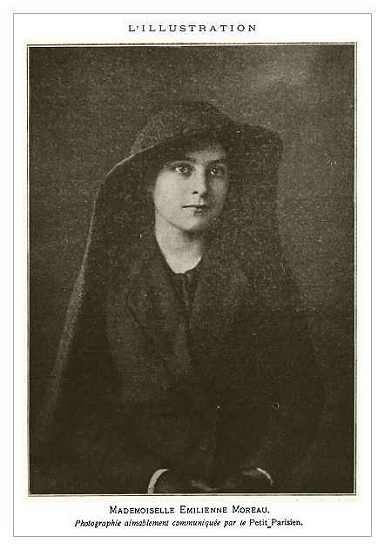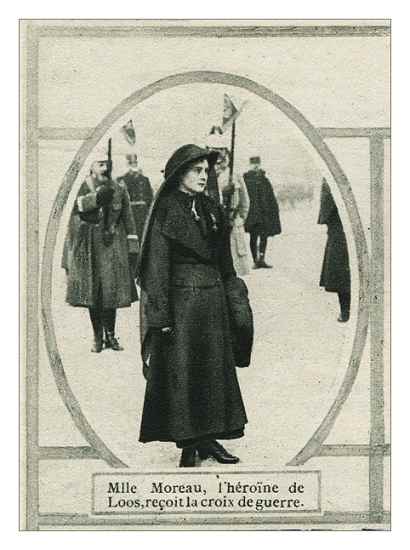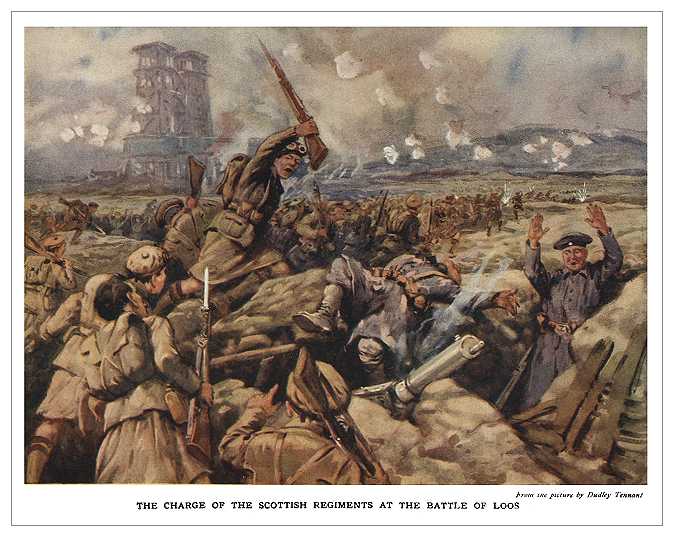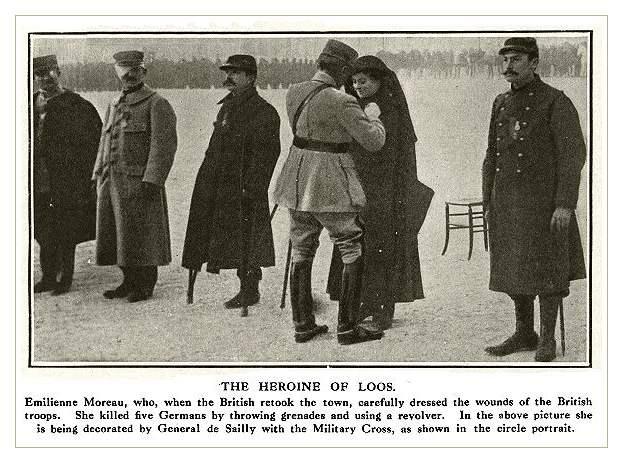



A Civilian Heroine


from the book
'From All the Fronts'
by Donald A. Mackenzie (1917)

The Lady of Loos
The story of "The Lady of Loos" is one of the most inspiring in the annals of the Great War. This French heroine's name is Emilienne Moreau, and she was only eighteen years of age when the battle of Loos was fought on that memorable Saturday in September, 1915, and the heroic British troops won a victory over the Germans, pushing back their lines and capturing many prisoners and guns.
Emilienne is a native of the village of Loos, and with the other villagers - chiefly old men and women and young children, for the able-bodied men were fighting in the armies of France - endured the perils of the fierce bombardment of the British guns, which compelled the Germans to crouch within cellars and dug-outs. The enemy had turned the village into a fortification. Earth-works on every side bristled with machine-guns. The cemetery had been converted into a fort; it was riddled with trenches, and tombs had, been cleared to make room for guns, so that each tomb became a machine-gun emplacement. Mazes of barbed wire crossed every roadway and bulged round every earthwork. The Germans were confident that the village was impregnable, and that they would hold it with ease against attack. But the British soldiers broke through every obstacle, fighting with great valour and determination until the village was completely captured. The Londoners approached from the south and assaulted the cemetery, and the Scots broke through on the west and the north.
Emilienne Moreau's home was situated in one of the little streets in the west side of the village. The villagers, huddled in cellars and in narrow rooms, heard the shells screaming overhead and bursting above and around the German redoubts and emplacements. All night long the clamour resounded far and near. Everyone was weary, yet none could sleep. Whispers went round that the attack would open at dawn, and all looked forward with confidence to victory.
When daylight came at length the roar of battle increased in fury. It was unsafe to venture out of doors, but brave men and women did so in quest of water and food for moaning and frightened children. Shrapnel bullets spattered on roofs and walls, time and again, and stray shells burst in narrow lanes, ploughing up the hard earth and wrecking buildings, which collapsed in clouds of dust. In the house next to Emilienne's a shell tore through the rose early in the forenoon and exploded in the backyard.
"The end is near," cried an old woman.
"Do not say that, mother," the daughter replied. "We are still safe."
"Our soldiers are at hand, my girl. That is what I mean when I say 'the end is near' - the end of the Boche rule here. Do you not hear the clamour of the machine-guns? The attack has commenced now.”
As she spoke, her husband ran into the house. "Ah! you are still alive," he exclaimed. He carried a pail of water and a loaf of bread.
"How goes the battle?" asked his wife.
"Our deliverers are at hand. I have seen them. They are not far off now."
"The soldiers of France?"
"No, not our soldiers, but those of our great ally; and they are kilted Scots, big brave men whom nothing will keep back. Hear them! hear them!" he cried, his eyes flashing with enthusiasm.
Confused shouts resounded above the din of batte.
"The Highlanders, the Highlanders are coming!" someone called from without.
"Did I not tell you they were at hand?" the old man said proudly. "I have seen them with mine own eyes."
The old woman peered from the window, and watched several Germans scampering past. "Ha! the Boches are running," she cried.
Then she caught a glimpse of a tall Highlander. "The end is near, as I have said," she murmured gladly.
Soon the street was the scene of fierce fighting. A German machine-gun swept it for a few seconds, and then stopped suddenly, for its team had been overpowered. Scots soldiers rushed past the doors, and German riflemen crouching on house roofs and behind windows tried in vain to hold them back. Many fell, but the survivors swept on, driving the Boches before them as an autumn gale drives fallen leaves through a forest. The villagers ran out of doors, risking their lives to help and succour the wounded. Bleeding High-landers were carried into the houses, where their wounds were bandaged, and they were laid on beds and couches. Kindly hands smoothed their aching brows and pressed cups of cool water to their burning lips.
Several wounded men lay in Emilienne Moreau's house. She helped to stanch their wounds, and showed great skill and sympathy in nursing them and attending to their needs. She seemed a born nurse, and her gentle words and sweet smile were like a tonic to the stricken soldiers.
All day long she nursed them, while the battle waged fiercely through the village. "Water, water!" was a constant cry. An old man who had been drawing water all forenoon lay dead beside the well. A German sniper, concealed on a roof, had slain him. Women who attended to the wounded, passing from house to house with no thought of their own safety, had been wounded or slain, and several children had perished. Yet the villagers continued their noble work. They were all inspired with the spirit which has made France great and strong. Time and again Emilienne drew water for her patients, and she had many narrow escapes.
There was much confused fighting. Positions were taken and lost and taken again during the day. In the afternoon the quarter in which Emilienne Moreau lived was partially regained by the enemy. But the Germans were ultimately isolated.
"They are coming back!" the shout went down the little street on one of the occasions when it seemed the Germans were regaining ground.
"Who? The Boches?" one villager asked another.
"Yes, they have rallied," called someone.
"No, no," another protested, "these are Boches who have been cut off and are trying to retreat."
A woman shrieked with horror. Through a shattered window in Emilienne's home she had seen a German soldier bayoneting a wounded Highlander in the street.
"They are killing the wounded," she cried.
As she spoke a German darted into the house. Emilienne caught a glimpse of his blood-stained bayonet, and a thrill of cold horror went through her. A kilted officer raised himself on his elbow and drew his revolver, but his hand shook as the German, uttering a curse, darted towards him. Quick as lightning, Emilienne seized the revolver and fired. The German fell in a heap on the floor. She hardly realized what she had done, and ere she could collect her thoughts the officer called out something. Another German had appeared at the door. He too was searching for wounded men. Without hesitation Emilienne sprang towards him, and raising the revolver again, pulled the trigger. The German fell across the doorway mortally wounded.
The air was thick with smoke. Emilienne glanced out at a window, but could not ascertain what was happening. A German soldier rushed past her, and then someone screamed near at hand; bullets whizzed through the air, and the groans of wounded men rose on all sides. But amidst that scene of horror and terror Emilienne remained fearless and composed. For her own safety she took no thought. Her sole concern was for the wounded men under her care.
After a long interval an old man ran across the street, shouting Emilienne's name, and she answered him.
"You are still alive," he exclaimed with relief.
"Two Boches tried to attack the wounded, and I shot them down," Emilienne told him.
"Hush! hide that revolver lest they should return and see you," be advised her.
"But they have been driven away," the girl answered. "They cannot return."
"The fighting surges backward and forward," said the other. He pointed down the street. "Some Boches still lie concealed among these houses. They are waiting for a chance to retreat, and are sure to come' this way."
Having thus warned the girl he ran back to his own house.
One of Emilienne's patients was calling for water, and she hastened to attend to him. Another plucked at a bandage round his head, repeating something over and over again which the girl could not understand. But she sprinkled water on his face, poured some drops into his mouth, and was comforted to find that he quietened down, having obtained some relief from his sufferings.
While thus engaged, she heard once again the sound of German voices in the street. Rising quickly, she went towards a shattered window and peered cautiously in the direction from which the voices seemed to come.
In the dim light she caught sight of four Germans coming out of a house where, as she learned afterwards, they 'had killed and robbed the wounded. They made signals to others she could not see. A cold shiver ran through her body. She glanced round the room at the helpless men who were under her care. The Highlander with the bandage round his head was shouting somebody's name, like a child calling for his mother. He was delirious and in pain.
The wounded officer seemed to be asleep. There was no one to give her aid if the enemy should come. Nearer and nearer came the sound of German voices. She glanced at the revolver, and then crept behind a chair. Kneeling down, she leaned her elbow on the seat and held her revolver towards the doorway. Stealthy footsteps sounded from outside. Someone was approaching her house. A prayer rose from her lips. Then she heard the welcome sound of rifle fire at the end of the street. Bullets whizzed past the window and smacked the stones like great hailstones. The prowling Boches had been observed and were being fired at. Then she heard hurried footsteps outside, and a German soldier flung the door open. She raised her revolver, and as a dim form entered the room she fired. The man fell and cried out with surprise and pain. A voice answered his and another entered. Again Emilienne fired, and the second German fell over the body of the first, while a third turned back and ran into the street, shouting a warning to his fellows.
For a few seconds the rifle firing slackened. Emilienne was uncertain whether the Germans had been driven back, or had overcome those who had attacked them. She remained kneeling behind the chair.
The room was dim with smoke. It seemed to grow darker. Then a cry from one of her wounded patients made her look round. A German had appeared at the back window of the small room. He leapt up on the sill to force his way in. A sudden faintness seized her, but she struggled against it, and darting towards the window fired again, and the German soldier tumbled back in a heap.
A single cartridge remained in the revolver. The next shot would have to be the last!
Emilienne drew a deep breath and waited, listening intently. The soldiers had ceased to moan, the wounded officer had been awakened by the sound of the revolver, and was leaning on his elbow, whispering something she could not understand.
Then the shouts of British soldiers broke on her ears. Londoners and Highlanders charging side by side came running down the street, sweeping the last remnants of Germans before them. They were opposed for a brief space by a fitful fire. But at length, one after another, the skulking Boches raised cries of "Kamerad! Kamerad !"
The battle for possession of the village was over and won. Emilienne dropped the revolver, and running to a window, called for help. Three British soldiers heard her, and at once entered the house, leaping over the bodies of the dead Germans. One could speak French, and was told by Emilienne what had happened. She pointed to the prostrate bodies at the doorway: "They were coming to kill the wounded," she said.
It was almost dark, and she took down a lamp and lit it with trembling fingers.
A British officer entered, and was told in a few words what had happened. "This brave girl," said a sergeant, "fought here alone against the enemy to defend our wounded men.
The officer bowed. "Your country may well be proud of you," he said simply, and shook hands with her. A group of British soldiers had gathered in the street, and when the war-stained heroes learned what Mlle Moreau had done, they raised a cheer, hailing her as "The Lady of Loos". And as "The Lady of Loos" she will always be known.
- Emilienne Moreau, (1898 - 1971)
- Decorated with the French Military Cross
- and the British Military Medal, Royal Red Cross
- and Order of St. John of Jerusalem
The story of Emilienne's brave stand against the Germans sent a thrill through France when it was related in the newspapers, and she was compared by more than one writer to Joan of Arc herself. A few weeks later she was publicly decorated at Versailles by General de Sailly, who, when he had related in dignified terms what she had done, declared proudly: "You do honour to the women of France.”
"Vive Ia Emilienne Moreau! Vive Ia France!" shouted the assembled soldiers and spectators.
Pale and agitated the comely French girl, who was attired in deep mourning for near relatives fallen in battle, bowed to the General and to the crowd that cheered her. And everyone who gazed on the slim, small woman wondered at her courage and daring on that memorable day when she baffled and drove back the cowardly Boches, who had sought to rob and murder wounded and helpless soldiers. She was a heroine indeed, and France was proud of her.
"Vive Ia Emilienne Moreau!" they shouted. Vive Ia France!"

from a French magazine

a close-up taken from 'The Times History of the War'

the same event from a different angle

